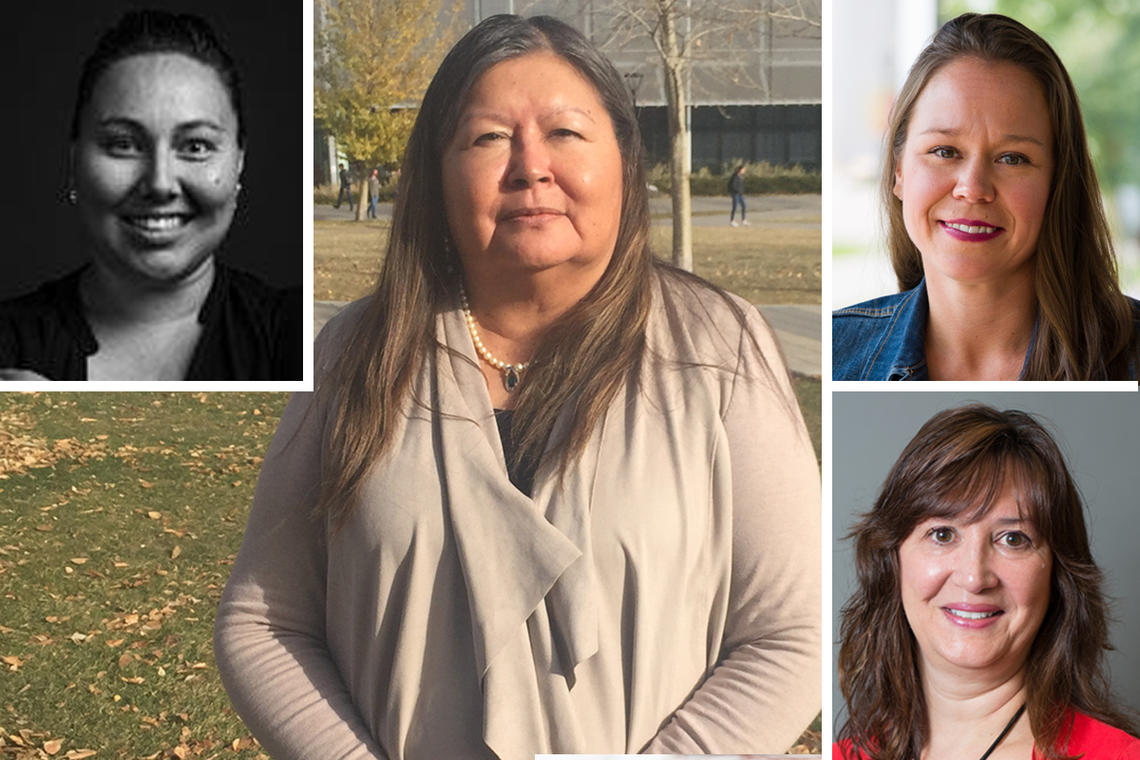Nov. 20, 2018
Indigenous scholars and leaders talk inclusion, empowerment and respect on the long path ahead

Presenters at a panel discussion as part of the ii'taa'poh'to'p update and gathering on Nov. 29.
On Nov. 29, the university community will celebrate one year of ii' taa'poh'to'p, the University of Calgary’s Indigenous strategy. As a direct response to the Truth and Reconciliation Commission’s 94 Calls to Action, this ambitious strategy aims to renew and develop authentic relationships with Indigenous communities, as we walk parallel paths toward genuine reconciliation.
“We’ve made some excellent progress in just one year, and I’m excited to share our journey with the community,” says Dr. Michael Hart, vice-provost (Indigenous engagement). Hart will deliver a strategy update alongside Dr. Dru Marshall, provost and vice-president (academic), and will be moderating a panel of four Indigenous scholars and community leaders as they share their thoughts on cultural inclusivity in ways of knowing, doing, being and connecting.
Building community connections
Dr. Genevieve A. Fox (Staahtsisttayaaki), from Kainai - Blood Nation, will bring a vital external perspective to the panel. A UCalgary alumna (EdD ’11) with more than 30 years of experience in Indigenous education, she is the current education director for the Blackfoot Confederacy Tribal Council which includes 15 K-12 schools and four colleges on the Kainai, Siksika, Piikani and Aamskapi Pikuni Nations.
“There are over 45,000 people in the Blackfoot Confederacy, and the majority of them are under 35 years old,” says Fox. “So, we need to work with all levels of education to empower students.”
- Photo above, clockwise from top left: Amanda Ens, Genevieve Fox, Vicki Bouvier and Yvonne Poitras Pratt will present a panel discussion as part of the ii'taa'poh'to'p update and gathering on Nov. 29.
Empowering Indigenous students on reserves is multifaceted. Fox lists a number of pressing issues in her community, including access to housing and childcare, opioid use and language barriers, which are being addressed slowly but surely. But for her, spiritual and cultural empowerment are the key to Indigenous student success.
“In our classrooms, an Elder gives a smudge and prayer at the beginning of the week and shares messages that teachers incorporate into their lessons,” she says. “And every morning we have a prayer and flag song.”
When language was incorporated into the Blackfoot Confederacy’s curriculum in the 1980s, “…it was like night and day,” says Fox. “With Blackfoot immersion, I saw these kids on task, they were even writing notes to each other in Blackfoot. After the first year, we tested and they were often jumping two grade levels in reading and math.”
What can we learn from Fox about empowering Indigenous students, staff and faculty here at UCalgary? And how do we share Indigenous ways of knowing with non-Indigenous people on campus?
The path ahead at UCalgary
Pam Beebe, panel organizer and the Indigenous cultural education and protocol specialist for ii' taa'poh'to'p, calls forth the popular slogan, "Nothing about us without us" in her vision for the future of the strategy. “Misrepresentation and misinterpretation are extremely common in larger institutions. We need to get it right, and the only way we can get it right is to involve Indigenous colleges and educators from the whole Treaty 7 region.”
Beebe also stresses the need for students, faculty and staff to seek out Indigenous knowledge here on campus through training, language courses, and programming. “Everyone has a responsibility to understand the place in which they live; the complex histories and cultures, including treaties, protocols and the wide range of languages.”
What we do on an institutional level sets an example for change at all levels of education, which is where Fox sees the most opportunity for a shift in perspective. “We need to naturalize Indigenous knowledge. Everyone should know who we are in the city, and it needs to go all the way back to high school and elementary curriculum.”
“This is just the start of an evolutionary change for UCalgary,” says Hart. “Ongoing dialogue, thoughtful reflection, building upon successes, and changing the general university narrative will move us forward in the coming months and years.”
Together in a Good Way: ii' taa'poh'to'p update and gathering
Join the conversation on Nov. 29 and hear more insights from Dr. Genevieve A. Fox, EdD, alongside Dr. Yvonne Poitras Pratt, PhD, associate professor and director, Indigenous education at the Werklund School of Education; Vicki Bouvier, doctoral student, Werklund School of Education; and Amanda Ens, MEd'18, manager of the Native Centre.
Nov. 29: 11:30 a.m. to 1 p.m.
MacEwan Ballroom
Seating is limited: RSVP here
